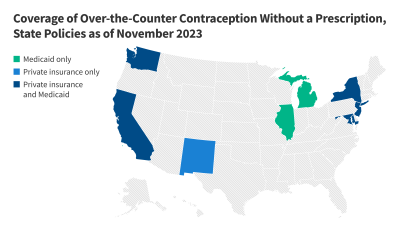 Considerations for Covering Over-the-Counter Contraception
Blog
Considerations for Covering Over-the-Counter Contraception
Blog
In October 2023, the Departments of the Treasury, Labor, and Health and Human Services issued a request for information to gather public input about the potential benefits, costs, and implementation considerations of requiring private health insurance plans to cover OTC preventive services and supplies without a prescription. This policy watch addresses key considerations for the implementation of insurance coverage for non-prescribed OTC contraceptives based on the lessons learned from KFF’s 2023 study of Insurance Coverage of OTC Oral Contraceptives.